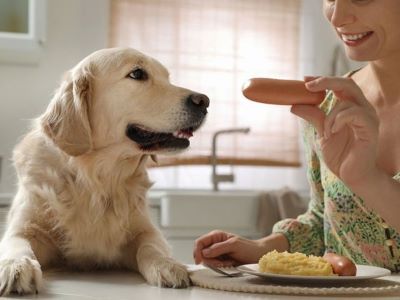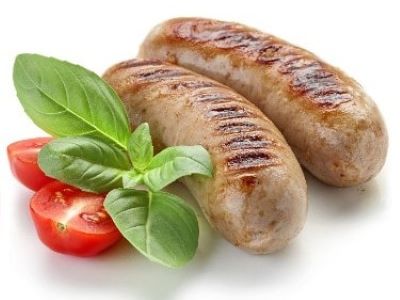You’re at a BBQ, the grill’s making exciting sounds, and your dog’s giving you those adorable “please share” eyes. But there’s a sizzling question in the air: Can dogs eat sausages? 🌭

It’s a true test of your willpower! But the truth is, understanding what foods are safe for your dog is no laughing matter. So, join us as we crack the mysteries of sausages in the canine culinary world, because what goes into your furry friend’s tummy matters more than you might think!🐾
Can Dogs Eat Sausages?
Dogs can safely eat unseasoned sausage in small amounts and in moderation. The world of sausages can be tempting but tricky for our dogs.🐶 While they can enjoy sausages once in a while, it’s really important to be careful and choose wisely. So, let’s dive into the world of sausages.
- Cooked Sausages: Cooked sausages are made from a variety of meats, including the classics like pork, beef, and chicken. While it’s tempting to share a slice with your pup, caution is advised. The high fat content in some sausages can be a recipe for digestive discomfort.
- Processed Sausages: These may seem like quick snacks for your dog, but they’re often packed with preservatives, sodium, and spices. The high salt content can lead to excessive thirst, bloating, and, in severe cases, sodium ion poisoning.
- Plant-Based Sausages: These sausages often incorporate ingredients like tofu, beans, or veggies.🥦🥕 While they might appear a safer bet, it’s essential to check the ingredients list for any harmful additives or spices. Some vegetarian sausages contain garlic or onions, which can be toxic to dogs in large quantities.

Note: It’s not just what’s in sausages🌭 but also how they’re made. Remove the casing and extra spices to make sausages safer. And don’t overdo it! Sausages are an occasional treat, not a regular meal for your dog.🐶
Risks of Feeding Sausages to Dogs
While sausages might be a tasty delight for humans, they come with a bundle of risks and dangers. It’s crucial to prioritize dogs’ well-being, here are some risks to take into consideration:
1. High-Fat Content
Sausages are often loaded with fat🍔 , which can be a double-edged sword for dogs.
While some fat is essential for their diet, an excess of it can lead to digestive issues and even more severe conditions like pancreatitis. It’s like offering your dog a tempting but risky high-calorie dessert.
2. Sodium Content
Sausages are notorious for their high salt content. Dogs, however, have a lower tolerance for salt compared to humans.
Consuming salty sausages can lead to excessive thirst💧, urination, and even sodium ion poisoning in severe cases[1]. Think of it as your dog diving into a saltwater pool without knowing how to swim.
3. Seasonings and Spices
The seasonings and spices 🌶 that give sausages their delicious flavour can spell trouble for your dog.
Ingredients like garlic🧄 and onions, commonly used in sausages, are toxic to dogs and can cause a range of health problems. Think of these seasonings as the sneaky villains in a tasty disguise.

4. Risk of Obesity
Lastly, the cumulative effect of regularly feeding sausages to your dog can lead to obesity.
Obesity in dogs can result in a range of health issues, from joint problems to diabetes. Picture it as the unwanted guest who crashes the health party and refuses to leave.🚫
Occasional Treat vs. Regular Diet
When it comes to sausages and your dog’s diet, there’s a crucial distinction between offering them as an occasional treat and making them a regular dietary staple.
- Occasional Treats
Sausages, being rich in fat, sodium, and potentially harmful seasonings, are best reserved for special occasions or as infrequent rewards. Offering sausages as an occasional treat means your dog gets to enjoy their taste without exposing them to the associated health risks.🍽
- Regular Diet
Making sausages a part of your dog’s daily or frequent diet can be problematic. Their high-fat content, combined with excess salt and additives, can lead to various health issues.
Importance of Moderation
Moderation is the golden rule when it comes to treating your dog with sausages or any indulgent snack. Dogs require a balanced diet to thrive. Excessive sausages can disrupt this balance, leading to nutritional deficiencies or excesses. ⚖️
By practising moderation, you ensure that sausages remain a delightful but occasional part of your dog’s life, safeguarding their long-term health and well-being.

Safe Ways to Feed Sausages to Dogs
If you’re keen to treat your dog with sausages, it’s essential to follow some things to ensure their safety and enjoyment. Here’s how to do it right:
- Sausages: Raw or undercooked sausages can carry harmful bacteria that might upset your dog’s stomach. Plain, cooked sausages are your safest bet, as they eliminate the risk of your dog ingesting potentially toxic ingredients.
- Small Pieces: Sausages should be sliced or diced into small, bite-sized pieces. This makes it easier for your dog to eat and reduces the risk of choking. Think of it as creating bite-sized portions fit for a dog.
- Remove Casing: To prevent any digestive discomfort or blockages, remove the casing entirely before serving. It’s like taking off the crust from a pizza – it makes the experience smoother.
- Monitor for Reactions: After indulging in sausage delights, keep a close eye on your dog for any adverse reactions. Look out for signs like vomiting, diarrhoea, or changes in behaviour. Monitoring ensures a quick response to any unexpected surprises.
Alternatives to Sausages
While sausages can be a delicious treat for dogs in moderation, it’s essential to consider healthier options to maintain their overall well-being. Here are some nutritious and dog-friendly alternatives:
1. Lean Meats
Lean meats such as chicken🍗 and turkey offer a protein-packed, low-fat alternative to sausages. They’re not only palatable but also easier on your dog’s digestive system. Cooked, boneless, and skinless poultry is a great source of essential amino acids.
2. Plain Cooked Vegetables
Vegetables are a fantastic way to provide essential nutrients without the excess fat and sodium found in sausages. Carrots and green beans, when steamed or boiled until soft, are excellent choices. They’re low in calories, high in fibre, and can be a satisfying and crunchy snack.🥕
3. Commercial Dog Treats
Specifically designed dog treats offer a convenient and nutritionally balanced way to reward your pup. These treats🦴 are formulated with your dog’s dietary needs in mind and come in various flavours and sizes. They’re often available in pet stores and provide a safer and healthier option compared to sausages.

4. Peanut Butter
Peanut butter, when given in moderation, can be a tasty and satisfying treat for dogs. Ensure it’s free from xylitol, a sweetener that is toxic to dogs. Peanut butter can be smeared on toys or used in puzzle feeders to keep your dog mentally stimulated.🥜
5. Fruits
Some fruits, like apples (without seeds) and bananas, are safe and nutritious treats for dogs. They provide natural sweetness and essential vitamins. Remember to remove any seeds, cores, or peels that may be hard to digest.🍎
FAQs
Is Chicken Sausage Good for Dogs?
All sausages aren’t “bad” for dogs, but they should be given to dogs in moderation, not as a primary food source. Even sausages without pork, including chicken or turkey sausages, have high fat levels and potentially other harmful elements (especially if it’s highly processed).
Can Dogs Eat Sausages?
Dogs can safely eat unseasoned sausage in small amounts and moderation. Be sure to thoroughly cook the sausages and cut them into small pieces. The high salt and fat content in sausages can be detrimental to your pooch’s health.
Can Dogs Eat Raw Sausages?
Sausage is high in fat and salt and may contain spices that are unsafe for your dog. In addition, raw pork sausage puts your dog at risk for trichinosis, a parasite infection. While some raw meats are okay for your dog, raw sausage is not recommended.
Conclusion
Can dogs eat sausages? Well, it’s all in how you serve them! Sausages, whether cooked, fancy, or veggie, can be a bit of a doggie dilemma.🐶
So, here’s the lowdown: Treat sausages like a rare, fancy dessert for your dog. But for everyday treats, consider lean meats, veggies, or dog-friendly treats.
Balance and moderation are the keys to keeping tails wagging and tummies happy!🐾
Reference:
- Thompson, L. J. (2023, September 19). Salt toxicosis in animals– MSD Veterinary Manual.



